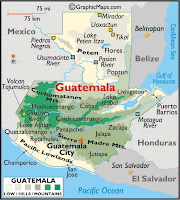According to witnesses and survivors, the driver was not familiar with the road. He was also going excessively fast and lost control of the bus rounding a curve. The brakes failed and the bus was sent off the road and down into a 164 ft. deep ravine (BBC, UPI, Herald Sun, Prensa Libre).
The paramilitaries were on their way to collect their salaries after having taken part in a government reforestation program.
There were about 60 passengers on the bus, all of them former members of the paramilitary civil patrols set up by the military to combat left-wing rebels during Guatemala's 1960-1996 internal conflict.
Hundreds of thousands of Guatemalans from rural communities were forced to join the civil patrols, and veterans have since campaigned to receive payment for their service.
The reforestation project the victims of the accident were working on was part of a government programme to create employment for ex-paramilitaries.In El Salvador, on the other hand, disabled veterans from the war recently agreed to leave that Cathedral that they had been occupying since December 20. Veterans from both the Armed Forces (ESAF) and the FMLN (though mostly from the former guerrillas) had been calling on the government to act on their proposal to extend pensions ($143-$230 monthly) to the mothers and fathers of roughly 7,000 soldiers and guerrillas killed during the war.
While the protesters still seems upset the the new government, the Catholic Church, and the Human Rights Office for their general lack of support, the Funes administration has agreed to study the proposal (Nuevo Herald, Contra Punto).
When we talk about the civil wars in El Salvador and Guatemala, we tend to measure the human costs into terms of the dead and the disappeared. We forget that there are thousands of people, if not millions, who carry the wounds of war with them on a daily basis. That's less so when it comes of the families of the disappeared, but it's pretty accurate when we are referring to the soldiers from all sides who live each day missing limbs, PTSD, and other scars of war.



No comments:
Post a Comment